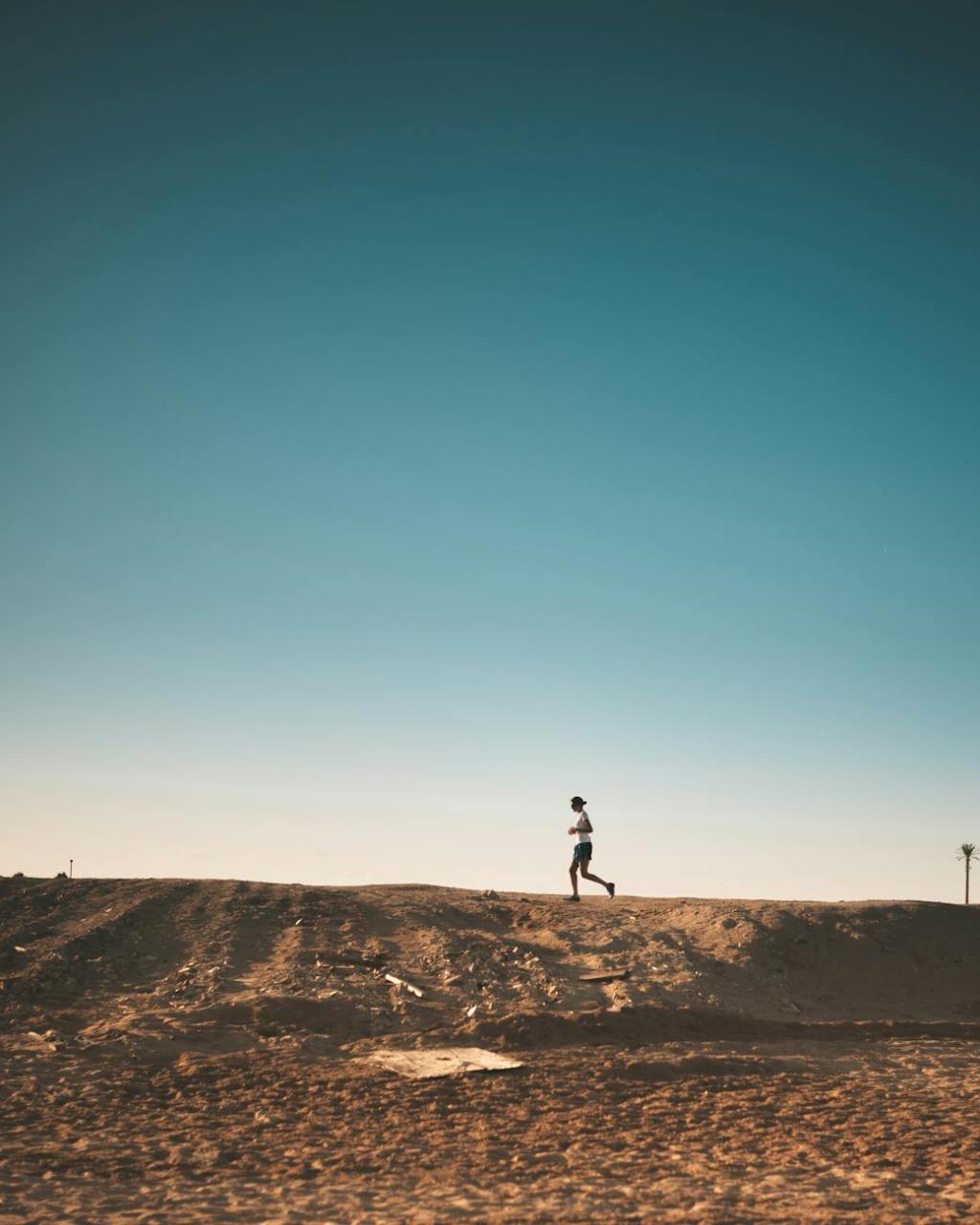I wasn’t supposed to be out here in the desert. The plan was to take a simple 1-hour flight from Algiers to Tunis, with the worst of the bumps coming from some light mid-air turbulence. To grant my visa, Algeria required both arrival and departure flights to be booked in advance, but I hated this plan and jumped on the first opportunity to change it. I wanted to travel the country by road, with solid earth beneath my feet. I wanted to cross vast distances where discovery was imminent and the experience might yield something meaningful. So with my visa in hand and my boots firmly on Algerian soil, I canceled my flight and worked out a new plan—one that would bring me to the small town of Negrine, Algeria—a launchpad for the Sahara Desert.
Maleyka, my AirBnB host in Algiers, mentioned she owned some land near the Tunisian border, and when I shared my hope to travel overland to Tunisia, she asked if I wanted to plan a trip together to her property. It was 8 hours by car and would take us through the city of Constantine, across varied desert landscapes, and bring me within an hour of the Tunisian border. From there, I could take a taxi to the border outpost and cross on foot. “Perfect!” I told her. She called two family members to join us, and we scheduled our departure.
Her cousin Musa drives like an asshole—no other way to say it. I like him and wish I had a more forgiving descriptor. But I don’t, because he’s an absolute bastard behind the wheel. We ripped along the highway, passing speeding cars at a breakneck pace. We hit speed bumps at tailbone-smashing tempos, sending us soaring from our seats at what seemed like every kilometer marker. He sped around blind turns, accelerated to top speed between potholed sections of road, and constantly stomped on the breaks to overcorrect his miscues. I clutched the “oh shit handle” with white-knuckle anxiety as he careened towards sharp turns with no guardrails. For some, a steering wheel acts like a key to unlock their inner asshole, usually tucked away safely behind a thin wall of civility. Musa is one of those people.
We arrived in Negrine, and I soaked up my surroundings. Visitors to the town are a rarity, with the exception of some Algerians passing through the region en route to somewhere else. It’s a pit stop, a place between places, a one-horse town without a horse. For those making their way east towards the Tunisian border or south into the Sahara, it’s a good stop to buy provisions for the journey or to have a simple meal. I’ve driven through hundreds of towns like this in my travels, usually watching them wiz by from the window of a bus. But this time, I had a chance to kick around with locals and discover what the highway could never show me.
As it stands, there are no hotels in town, only two or three bus stop restaurants, a few shops to buy supplies, and tea salons where men pass much of the day. The “new” town is unsightly, with plastic bags lodged in the branches of beautiful olive trees, discarded soda bottles filling street-side gutters, and wrappers from chips, candy bars, and other junk food tumbling along in the light desert breeze. Old vehicles with flat tires and missing doors sat junked in front of buildings. It all baked under the heat of a cruel sun, items past their prime and with nowhere to go. Yet, a short distance from the town, a different Negrine exists. Old Negrine, ancient Negrine—the Negrine I’d come to see.
My hosts paraded me around town over my three-day visit like a gubernatorial candidate. I shook hands with half the community, met the mayor and several councilmen, and waved at the children playing games in the street. The people were kind, but my great joy in Negrine was exploring the ruins of a Roman structure that had been continuously inhabited for nearly 1800 years before being abandoned under French occupation. A labyrinth of stone walls, crumbling archways, and uneven window openings left a blueprint of history. I pieced together the town as I walked its vacant paths, imagining where food was stored, community meetings were held, and family dwellings were arranged. The decay and neglect of the ruins create surprisingly stunning imagery, and the lack of commercialism adds to the grandness. Tourism is low in Algeria, and the location is extremely remote. No guards, no guides, and no workers roamed around. It was just us in the town that time forgot—a sensation hard to come by in a heavily traveled world.
The structure leans against an oasis filled with date palms, pomegranate trees, and a channel of running water. We took off our shoes, soaking our feet in the cool spring, then laid out a picnic of roast chicken, couscous, and watermelon we purchased earlier in the day. After lunch, the group laid under the shade of nearby palm trees while I sat, staring at the contrast between the green canopy of the oasis and the tan expanse of the Sahara. The sands reached to the horizon in every direction, like a great sea to the south. The colors collided in my mind, feeling almost unnatural, the same way seeing a lush golf course in the midst of a desert appears. I drank in the view, knowing it was special—really special—and I’d likely never be in this place again.
That evening, we collected some sheets and pillows from the house where we’d been staying and went to a friend’s coffee bar, the only business next to the ruins and the oasis. Monsur, a local born and raised in Nagrine, owned the place and was working with Maleyka on a plan to partially revitalize the ruins. At 62, his skin is weathered from a lifetime under the desert sun. He has short white hair and a sandy layer of scruff surrounding his smile. His thick fingers always seemed to hold the last drag of a cigarette in one hand and a small espresso in the other. When we arrived at his property, he went into his simple shack and pulled out a large carpet and draped it on the ground. He then walked back to the shack and pulled out some 3-inch-thick mattresses, which he placed on the carpet. Maleyka used the sheets and pillows to make each mattress into a bed.
We spent the evening listening to music, eating bread and chicken, and then camped under the stars with the ruins to our left and the desert to our right. The soft sound of palm fronds gently rustled in the breeze, but all else was still through the night. It was one of the finest nights of sleep I’d had in months.
In the morning, we had coffee, bread, and bananas for breakfast, then jumped in the car with Monsur, bound for some nearby sections of the desert we had to see. We visited a spring-fed pool in the oasis where we could swim, drink coffee, and cool ourselves off from the unrelenting heat. I jumped into the pool, feeling the cold water pull the sweat from my skin. I relaxed instantly and turned on my back to float. Musa and Monsur, both in their early 60s, were having contests to see who could swim further underwater without coming up for air, then racing each other back and forth like children at the community pool. It was all so easy for a moment. Life without a care.
We dried off and went back to the car, taking in the last bits of the view before driving off the road and directly into the desert. Monsur directed us to a partially constructed wall standing alone in a vast open expanse. It’s forgotten by the world, yet it’s seemingly the most notable remnant of Roman Numidia at this site. We stepped out and walked through the scattered blocks and stones. Shards of pottery half-buried in the packed sand littered the earth’s surface below my feet. Chunks of amphora handles and the necks of broken jars seemed to jut up, waiting to be discovered. I looked down upon the tops of ancient stone walls never excavated and climbed into an approximately 2000-year-old water basin where one lone date palm stood, drinking every last drop of moisture available to its roots.
“If a tourism infrastructure existed, the landscape could be ripe for intrepid travelers,” I told Maleyka.
“That’s what we hope to do here. Revitalize a portion of the ruins, build a guesthouse or two, a restaurant with clean food, and get the community on board,” she said. “It’s risky, but for me, this place is so beautiful, and I think it’s good for my country.”
We spent the evening at Monsur’s coffee bar, where a large meal was prepared for my last night. Monsur cooked chicken on the barbeque, and a few friends of his made hmiss (an Algerian pepper dip), along with chopped onions and fresh Algerian flatbread. We drank tea, made jokes, I demonstrated some jiu jitsu on a young guy eager to learn, and he showed me how to climb a date palm tree barefoot and in under a minute. I relished the moment, feeling its fleeting nature as we lived it together. A meal with new friends was the perfect way to end my time in Algeria.
The next morning, I awoke at 6 a.m. to Maleyka calling my name and noting the taxi was outside. I knocked the cobwebs loose, rubbed the sleep from my eyes, and ran to the bathroom for a quick cold shower. I came out, swallowed a mouthful of espresso she’d made, and grabbed my bag. I hugged and thanked her for everything, shook hands with her cousins, then walked out of the house and jumped into the taxi, leaving as quickly as I came. I was bound for the Tunisian border, eager to step into another pocket of discovery.





Leave a comment